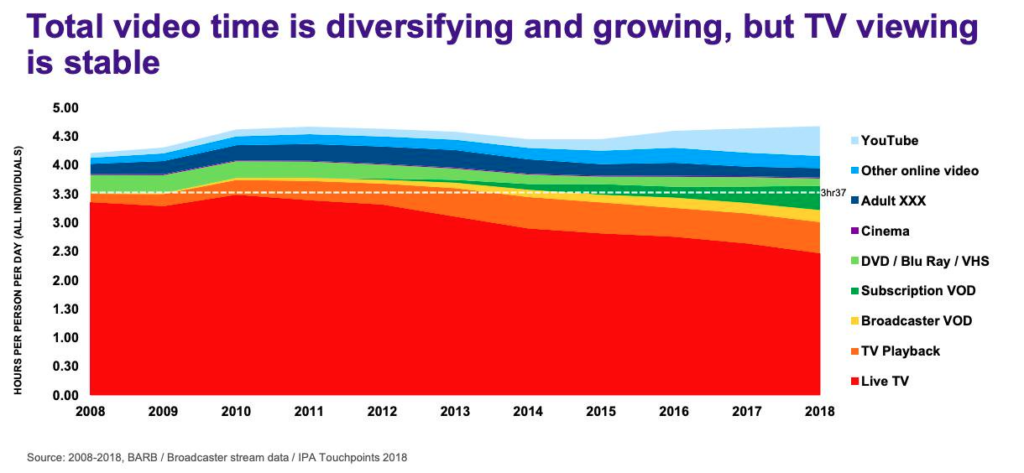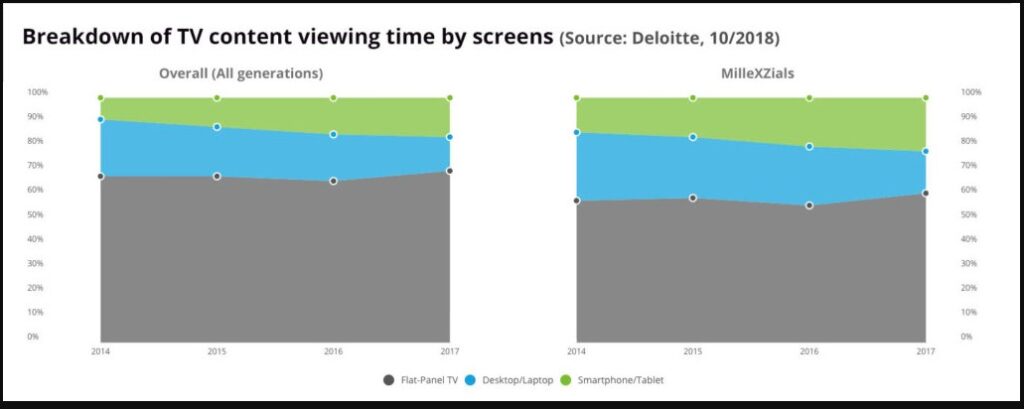Address
304 North Cardinal St.
Dorchester Center, MA 02124
Work Hours
Monday to Friday: 7AM - 7PM
Weekend: 10AM - 5PM

TV viewing habits have shifted. Broadcasters, advertisers, operators, and content owners have all accepted this fact. Nobody can predict how quickly content consumption will shift from linear to catch-up.
However, overall TV viewing is not decreasing, but rather maintaining a high level, as evidenced by BARB statistics (kindly provided by Rupen Shah/Thinkbox). Vieewing is simply changing its shape.

Broadcasters have primarily attempted to address this paradigm shift by launching online and mobile services. This does not solve the problem because people still want to watch TV content. Desktop viewing is declining, not increasing, and mobile viewing accounts for less than a quarter of SmartTV viewing. Currently, Smart TV is by far the most popular platform for viewing streaming content, as evidenced by the following figures: Netflix 70%, BBC iPlayer 60%, and Hulu 70%. I’m tempted to say that the broadcasters’ investment is misguided. They are missing the main message, which appears to be lost in the “digital buzz” at times:

So, why aren’t broadcasters utilising television as effectively as they should and can?
TV provides the best video/sound quality, is less distracting, is convenient, and keeps you company, among other benefits (you can read more from here). Aside from content (which is another important topic for a blog), the user experience is crucial in attracting viewers. How far away is the content that consumers (might) want to see? Netflix’s desire to have their own button in, say, Philips TV remote controls is not by chance. All broadcasters already have this button: the majority of people still turn on the TV by pressing the number buttons, so why not use it to its full potential?
The fact is that all of the major streaming service providers have already recognised the value of the remote control and are leapfrogging the traditional broadcasters. They are on top. I am continually surprised to hear broadcasters refer to HbbTV as a “cost.” It is not a COST; it is a battle that must be won, a battle for control of the remote control and the viewer. The combined and integrated user experience of linear and on-demand viewing is a game changer that streaming/OTT providers cannot yet match on a large scale.

Many broadcasters I speak with want a “unified user experience” across multiple devices. One of the reasons SmartTVs are still underutilised is that a broadcaster must invest in 5-10 different SmartTV apps, unless they rely solely on HbbTV. Standard that is supported by nearly all new televisions sold. HbbTV provides you, as a broadcaster, with two-click access to your streaming service, eliminating the need for app store visits or app installation. It is a sandbox that you can control, promote during your shows, integrate into the programme guide, and provide viewers with direct access through their remote controls.
Thankfully, some have.
Consider where the most knowledgeable broadcasters from Spain, France, Lithuania, Finland, Estonia, the United Kingdom, or Australia are located. They have not only reacted, but have also collaborated to win the game and reclaim control. Services like Freeview, Salto, LovesTV, HiTV, and TasutaTV are the way forward, providing a combined linear and on-demand offering that is easily accessible without the need for app installations or hassle. All of this is based on HbbTV, a common technical platform that runs on 99% of TVs.
It provides a standard-based approach that is supported by governments, consumer electronics manufacturers, broadcasters, and operators. Developing the fastest growing single TV technology platform for local and global players. It significantly reduces the technology investment that broadcasters must make in order to build quality services with enough reach for both content owners and advertisers to jump on board. It gives broadcasters the assurance and dependability they need to look forward with confidence.
The next logical step would be to pull broadcasters’ content from streaming services in order to compete with Netflix using their own tactics: content. Oh, but it’s already happening, at least in France.
My prediction is that whoever controls the remote will win the game. It is no longer a question; HbbTV is the vehicle through which broadcasters can compete and win, or they will diminish and die.
Read more on the topic HbbTv in out latest blog: What is HbbTv?

